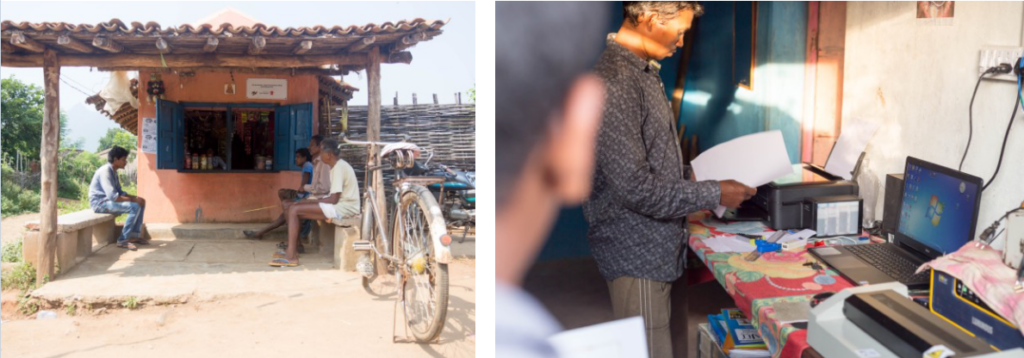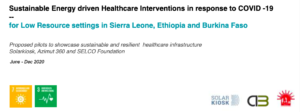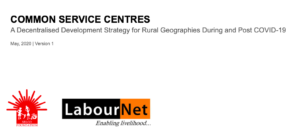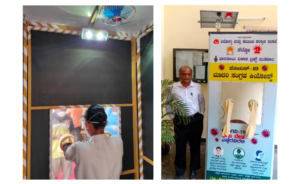Access to digital services – printing, photocopying, photo studios – are integral for entities such as government offices, schools and colleges, financial institutions, local businesses etc. These services become critical in undertaking business transactions, maintaining records and for individual households in accessing bank and government schemes, subsidies and so on. The lack of such facilities in rural, tribal and peri-urban communities means that households and small businesses spend a significant amount of time and money in trying to access these basic services. The erratic power situation or complete lack of electricity inhibits the establishment of such digital service centers in rural and peri-urban settings. Where small entrepreneurs do set up shops, erratic power cause severe disruptions in business- leading to breakdown of equipment, inconsistent service provision and loss of income.
The Lok Sewa Kendra or LSK is a solar powered digital service center that gives a comprehensive set of solutions from a single photocopy machine to multiple systems. Some of these are co-located at the house of the entrepreneur, while others are located in village centers or within the premises of local government or educational institutions. A large percentage of them, implemented by SELCO Foundation or though the SELCO Foundation channels, are financed through bank loans that are being paid off by the entrepreneur through the increased income from the business.
The onset of COVID 19 and the subsequent lockdown imposed by the Indian government directly affected the business and income of these LSKs. However, a few LSK entrepreneurs managed to not only serve customers but also increase their income through certain coping mechanisms.
Solution Overview
The cases of two specific LSK entrepreneurs in Kalahandi- Subas Chandra Disari of Hirapur (in Jayapatna) and Haru Majhi of Dumerpadar (Thaumal Rampur) – are particularly interesting in terms of resilience and the value of decentralized energy systems and micro-energy entrepreneurship. Kalahandi district in Odisha is one of the poorest districts of the country, with a large population of tribal communities who have historically faced challenges of poor socio-economic development. In such a region, the effects of a lockdown such as the current one could strike a deathblow to many micro entrepreneurs, but these two entrepreneurs are finding ways to cope with the current crisis.
Diversification and reliability of services:
The solar powered Lok Sewa Kendra afforded Subas Chandra Disari of Hirapur in Jaypatna, Kalahandi, an opportunity to add a banking kiosk of the State Bank of India (SBI) to his offerings at the center. Such banking kiosks require reliable energy services and digital systems allowing for easy withdrawal, deposits and other transactions for locals in the area. This is the only kiosk of this sort in the local village panchayat jurisdiction. As banking is considered an essential service, the kiosk was allowed to stay open during the lockdown and allowed Subas Disari to continue some aspects of his business.
While the lockdown has affected income from a variety of services, the banking kiosk continued to bring in money. People have come in to withdraw money from their accounts, and to collect monthly subsidies and stipends from various government schemes including LPG subsidies, Jan Dhan Yojana and so on. His typical monthly income prior to the lockdown was INR 10,000 per month. In April, he earned around INR 15,000 as his incentive from the bank for all the transactions undertaken through the banking kiosk.
Reliability of the Energy System:
The day after the announcement of the lockdown, a huge failure in the power system caused the transformer near Hirapur to break down. The entire area remained without electricity for a period of 40+ days in the midst of the lockdown. Without access to the solar powered Lok Sewa Kendra, households would have had to find ways to travel more than 12 kilometers to the nearest bank to withdraw cash for basic needs. This would have been particularly difficult in the absence of all public transportation and the ban on movement of private vehicles. The entrepreneur said that solar truly saved us during this difficult period. This experience provides an important learning in the efforts to create more resilient local communities.
Creation of Linkages and Networks:
As the LSK became more popular and was used more regularly by the local community in Dumerpadar of Thaumal Rampur in Kalahandi, Haru Majhi, the LSK entrepreneur, was able to expand his networks and take on additional work through local government channels. His networks and popularity of the LSK resulted in him becoming a Gram Saathi for MGNREGA (Employment guarantee programme) in his village. His role involves mobilizing people within the village that are lacking employment and facilitating their access to work through MGNREGA. For his effort as a Gram Saathi, he gets an income of INR 4 per person per day. This will continue to be an important channel for Haru Majhi in the coming months as many migrant labourers return to their rural homes and will need some guaranteed employment to ensure a basic income for their household.
Key Takeaways
The ability to diversify income sources is a quintessential part of the Lok Sewa Kendra. By using decentralized solar energy to power digital services, a local petty shop can be transformed into a service center that also allows for the convergence of government schemes, banking transactions, mobile phone recharge and other essential services.
The energy system being decentralized and powered by solar energy played a critical role in making the local community resilient in the face of a power failure that lasted more than 30 days. Localization, decentralization of energy systems and energy governance should be an important element of reshaping our societies so we are better able to deal with crisis situations of this nature in the future.






